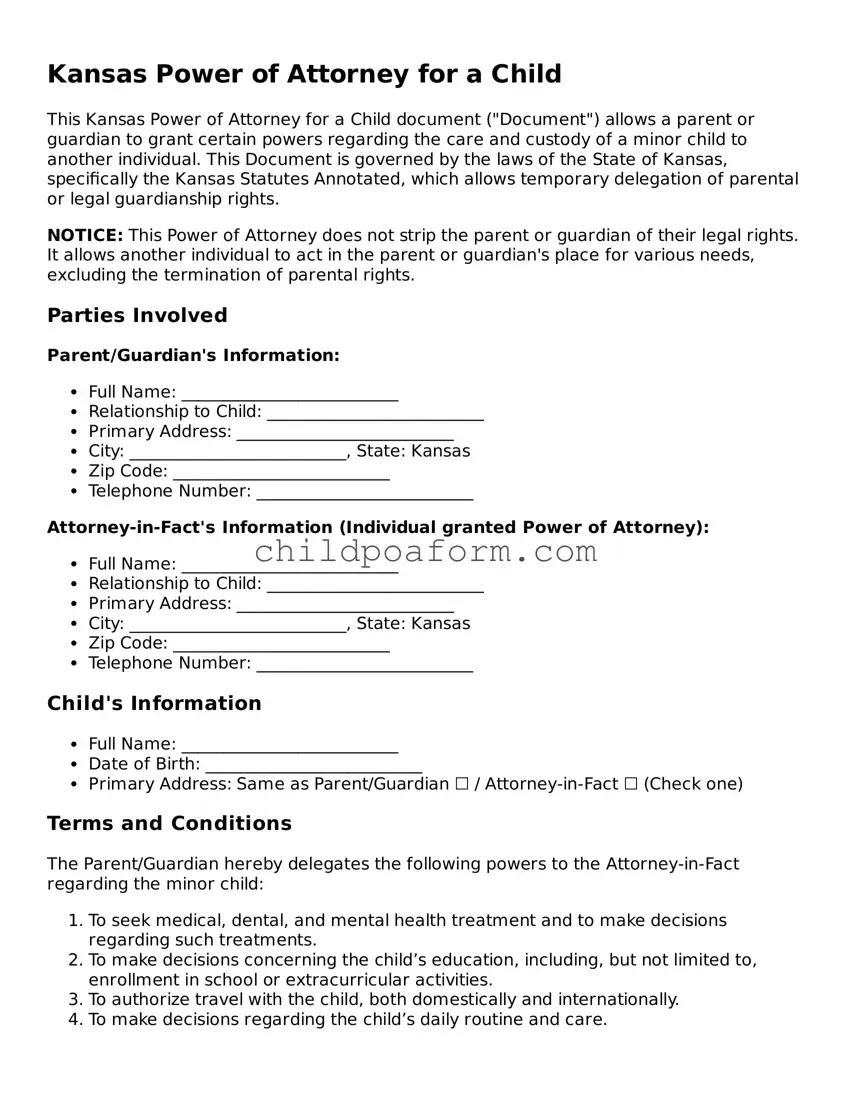The Kansas Power of Attorney for a Child form shares similarities with the General Power of Attorney document. Both serve as legal instruments allowing one person to grant another individual the authority to make decisions on their behalf. While the General Power of Attorney can cover a broad range of actions across various aspects of the principal's life, the Power of Attorney for a Child is specifically tailored to granting decision-making power regarding a minor child, including their care and custody.
Another document closely related to the Kansas Power of Attorney for a Child form is the Medical Power of Attorney. This particular form enables a person to designate an agent to make healthcare decisions for them when they are incapable of doing so. Similarly, the Power of Attorney for a Child often includes provisions for making decisions about the child's health care, proving its usefulness in situations where the parent cannot be present to make those decisions.
The Durable Power of Attorney is also akin to the Power of Attorney for a Child. The durability aspect implies that the document remains in effect even if the principal becomes incapacitated. While a Durable Power of Attorney is frequently used to address financial and healthcare decisions for the principal, the Power of Attorney for a Child specifically focuses on the needs and wellbeing of the minor child under the care of the agent.
The Temporary Guardianship Agreement shares objectives with the Kansas Power of Attorney for a Child form. Both are used to grant another individual temporary authority over a child's care when the primary parents or guardians are unable to fulfill their roles. However, the Temporary Guardianship tends to be more formal, often requiring court approval, whereas a Power of Attorney can be a simpler and more expedient arrangement.
The Educational Power of Attorney is another document related to the Kansas Power of Attorney for a Child form. It specifically allows an agent to make educational decisions on behalf of a child, including enrollment and daily school-related activities. While the Power of Attorney for a Child can encompass educational decisions among others, an Educational Power of Attorney focuses exclusively on the educational aspect.
The Financial Power of Attorney document, while typically used to grant an individual authority to handle another person's financial affairs, also parallels the Power of Attorney for a Child in its structure and delegation of authority. In contrast, the child's version prioritizes the child’s welfare, health, and education over financial decisions, although financial decision-making could also be a component depending on the document's stipulations.
The Child Travel Consent form is similar in its intent to ensure a child's welfare, akin to the Power of Attorney for a Child. It grants permission for a child to travel with a designated individual or alone under certain circumstances. Although not a Power of Attorney in function, it reflects the principle of assigning responsibility for a child’s care to another person, particularly in the context of travel.
The Health Care Proxy is another document that parallels the Medical Power of Attorney aspect of the Power of Attorney for a Child. It enables an individual to appoint an agent to make healthcare decisions on their behalf, similar to how medical decisions can be made for a child by an agent under the Power of Attorney for a Child. Both documents are crucial in ensuring the health and safety of the person they protect.
The Child Custody Agreement, often part of family law proceedings, also shares similarities with the Kansas Power of Attorney for a Child. It outlines custody arrangements and is designed to serve the best interests of the child. Unlike the Power of Attorney, which can be a temporary arrangement without court intervention, custody agreements are typically formalized through the court system but similarly focus on the child’s care and wellbeing.
Lastly, the Special Needs Trust document, while fundamentally different in its application, has a similar underlying intention as the Power of Attorney for a Child in terms of providing for someone’s care. It allows for the management of assets for the benefit of an individual with special needs without affecting their eligibility for public assistance. Like the Power of Attorney for a Child, it represents a tool used by caregivers to ensure the wellbeing of a dependent, focusing on long-term care beyond daily decision-making.
